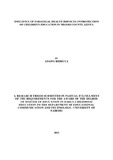| dc.description.abstract | The demand for paralegal health services has been growing steadily, particularly as a result of
children’s poor health that has been worsened by devastating effects of HIV/ AIDS and as an
attempt to improve Early Childhood Education. Specifically, paralegal health services are crucial
in protecting children’s right to Early Childhood Education given that health services are vital in
determining performance of children. Although paralegal health services have been recognized
to contribute towards enrolment and retention of children at ECE level, little has been
documented and explored on how it influences protection of children’s right to Education and
sentiments are rife that many children have not been enrolled in ECE as the issue of poor health
continues to intensify. This necessitates a comprehensive investigation to provide information on
how paralegal health services protect children’s right to education with regard to provision of
medical services, nutrition services, awareness/ sensitization services as well as counseling
services. In view of this, the study purposed to establish the influence of paralegal health services
on protection of children’s right to Education in Migori County, Kenya. Literature reviewed was
discussed in light of the variables influenced by paralegal health services for protection of
children’s right to ECE. The study was anchored on Classical Liberal theory of equal opportunity
in education which asserts that each person is born with a given amount of capacity which to a
large extent is inherited and cannot be substantially changed. Using descriptive survey design,
the study was guided by four research objective and four questions. Questionnaires and interview
schedules were the tools that solicited information from 16 individual paralegals, 40 parents, 20
head teachers, 19 ECE teachers, 18 health officers, 15 NGOs, 18 Traditional Birth Attendants,
200 ECE children as well as 1children’s officer. Tools were first appraised by the supervisor for
validity then pilot tested for reliability. Data collection took 3 months with questionnaire
administration and interview schedule taking place concurrently after getting consent from
various authorities. Data analysis and processing involved editing, coding and thematic
categorization of data which quantitative data was pulled for overall scores, ran through SPSS
version for frequencies and percentages then presented in tables and graphs. Qualitative data was
however, summarized, thematically, arranged and presented in narrative form. Results of the
study indicated that paralegal health services was by and large inadequate and unreliable leaving
majority of ECE children in poor health hence unable to attend their education. The inadequacies
were attributed to limited resources both human and materials for children. Conclusion were
drawn from discussions and recommendation made on how best to strengthen provision of
paralegal health services by forming linkages to ensure regular flow of health services, upscaling
the resources allocated for ECE, disbursing fund on regular basis as well as employing
more health staff to cater for the needs of all children. The study recommended the need to
replicate the same study within a wider scope and to determine other aspects influenced by
paralegal health services to protect children’s right to Education. | en_US |

